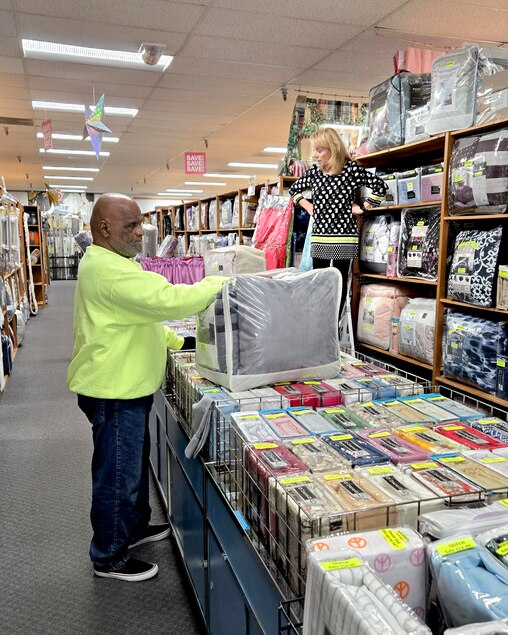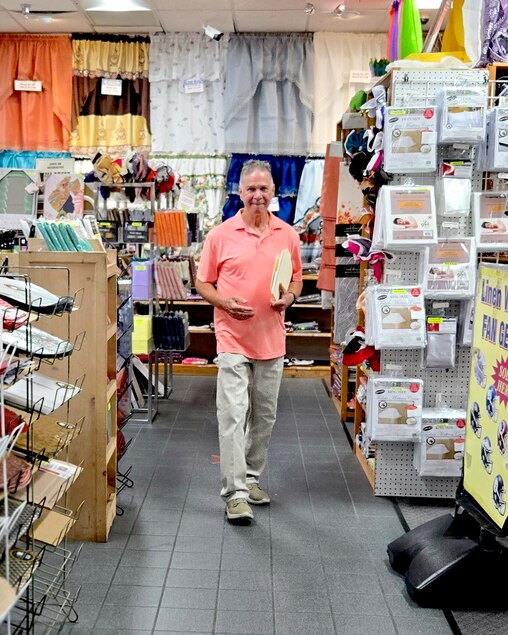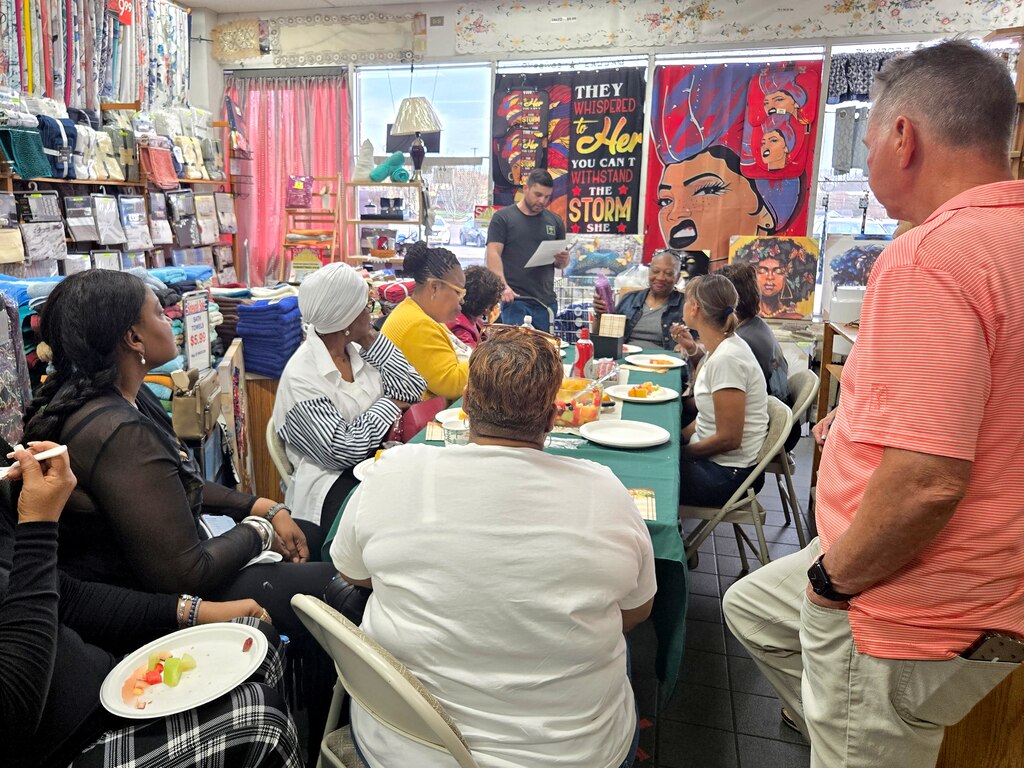When President Donald Trump began his second term in January, Linen World was among the last of a dying breed.
The family-run store, tucked in a suburban Prince George’s County retail strip, had sold curtains, bedding, towels and other home goods since 1988, surviving even as its peers were swallowed by big-box stores and online retailers.
Then, Trump’s federal workforce cuts and tariff hikes dealt a one-two punch that Linen World couldn’t withstand.
It closed for good last week.
Trump has warned Americans to brace for short-term pain as he pursues long-term goals of rooting out government fraud and restoring U.S. manufacturing. But small businesses like Linen World say they can’t afford even temporary upheaval.
“I don’t think [Trump] appreciates that people on the fringe can’t take that short-term hit,” said Michael Gaister, Linen World’s co-founder.
Read More
As mass layoffs of federal workers rippled through suburban Washington, Linen World’s customer base became tight with money, and sales plummeted. Then came 145% tariffs on Chinese imports, which Gaister said made the store’s future untenable.
Following the path of his father, a Holocaust survivor who immigrated to Maryland and sold women’s clothes, Gaister left a career in accounting and started Linen World with his wife, Dee, 44 years ago in Manassas, Virginia.
Seven years later, the Gaisters opened a store in Oxon Hill, three miles east of the D.C. border. It became the most successful outpost of the family’s linen emporium, outlasting four other locations and even mega-chains like Bed Bath & Beyond and Linens ‘n Things.
“It was our life,” Michael Gaister said. “A lot of memories, for sure.”
Over the years, Linen World remained stubbornly true to itself, even as everything around it changed. The store never advertised, never built a social media presence and relied primarily on word of mouth to draw customers.
For four decades, it sold the same Brazilian washcloths for 99 cents, priding itself as a place to find a deal.

As online retailers became a bigger threat, Linen World doubled down on building relationships with customers.
Linda Dimps, a 71-year-old from southeast D.C., remained a loyal Linen World shopper for more than 20 years because the employees were friendly, knowledgeable and attuned to her tastes.
“You got to know everybody in there,” Dimps said after purchasing a tablecloth on April 14, Linen World’s final day in business.
Store manager Felica Roberts said Linen World had a policy of greeting every customer who walked in the door. Kids who visited often received small gifts and prizes from Dee Gaister, fostering relationships that kept families coming back for generations.
“When the children got older, they’d come and say, ‘My mom used to come here, and she would take me with her. And now here I am, 25 years later shopping in the same place where my mom shopped,’” Roberts said. “It was great hearing that.”
By 2021, Michael and Dee Gaister were ready to step back. They turned the business over to their son, Jason, at a time when it was struggling to keep pace with online behemoths like Amazon, Temu and Shein.
In an effort to modernize Linen World, Jason Gaister launched the store’s first website and tried expanding its customer base to businesses like Airbnb. But Gaister said surging electric costs, rising rent and slumping sales pushed Linen World to the brink. Last year, Michael Gaister took $130,000 out of his savings to ensure employees received their paychecks.
As Trump returned to the White House in January, the Gaisters anticipated that the administration’s promise to lay off federal workers and impose tariffs on foreign imports would further destabilize their business.
In some neighborhoods around the store, 1 in 4 workers hold federal jobs. Long seen as stable and reliable, those jobs built a strong middle class that fueled the local economy.


The impact of the cuts imposed by the Elon Musk-led Department of Government Efficiency, or DOGE, was far worse than the Gaisters had anticipated, they said.
February was the store’s worst month ever, as many in the community pulled back on their spending. Sales dropped over 50% from the previous year.
It was enough of a jolt that by March, the family decided to close Linen World.
“People got spooked and didn’t want to spend money,” Jason Gaister said. “They didn’t know what was going to happen, and that really showed in our sales.”
Even if Linen World had weathered the downturn driven by federal worker layoffs, the Gaisters say the store wouldn’t have survived what came next: Trump’s escalating trade war with China, which produces more than 90% of the store’s merchandise.

Trump has said companies can avoid paying the punishing tariffs by buying from American manufacturers. But the Gaisters say that isn’t realistic. The U.S. doesn’t produce many of the goods Linen World sold, and building that manufacturing capacity would likely take years, if it happens at all.
Linen World would have had no choice but to keep buying from China — at 2.5 times the cost — and raise its famously low prices. The Gaisters knew that wasn’t viable.
“There’s no market for everything that’s in the store to be two times the price,” Jason Gaister said. “That’s just not possible.”
In Linen World’s waning days, customers filled the store in a final show of support, waiting in hourlong lines to pay and leaving behind handwritten thank you notes.
By its final hours, the shelves were mostly bare, but dozens of customers streamed in anyway, picking through the scant items that remained and marking the end of an era. A child paraded through the store with a T. rex figurine, pulled by Dee Gaister from the store’s prize box.
Toward the back of the store, Michael and Jason Gaister took apart shelving units that once displayed comforters, placemats, throw pillows and towels, leaving stacks of wooden planks on the floor.
The family plans to step away from retail. Michael Gaister wants to retire and spend more time in Florida. Jason Gaister is considering getting his real estate license.
“I don’t think that there’s a lot of opportunity in retail anymore,” Jason Gaister said.
The Gaisters said the hardest part of closing Linen World was breaking the news to their employees, many of them older women who also used to be customers.
Roberts, the 56-year-old store manager, had lost retail jobs before. But she said this layoff hit harder because of the bonds she formed with her coworkers and customers.
“When they did tell us that it was going under, I cried like a baby,” Roberts said. “It’s like losing a home.”





Comments
Welcome to The Banner's subscriber-only commenting community. Please review our community guidelines.